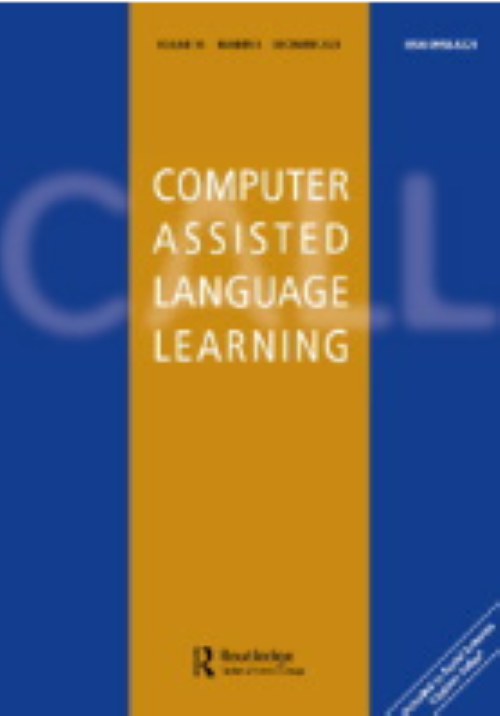考察学习者背景、熟练程度和数字设备使用对非正式数字英语学习的影响:一项解释性混合方法研究
IF 6.6
1区 文学
Q1 EDUCATION & EDUCATIONAL RESEARCH
引用次数: 0
摘要
摘要在计算机辅助语言学习(CALL)中,学习者背景与基于课堂的数字语言学习之间的关系得到了广泛的研究;然而,非正式数字英语学习(IDLE)这一CALL研究的重要子领域却很少受到关注。在我们之前的IDLE研究的基础上,本解释性混合方法研究通过对1080名中国大学英语学习者的问卷调查和对9名被调查者的访谈结果,开始检查和探索IDLE与学习者人口统计学之间的关系。定量结果显示,IDLE的差异可以单独解释,也可以与学习者的人口统计信息、社会经济背景、熟练程度、数字设备的使用以及这些因素的预测能力相一致。结果表明,性别、大学类型、学生自评口语能力、标准化考试成绩和使用数字设备的数量对IDLE的差异有影响。学习者的专业、写作技能、设备使用时间、种族、家庭收入和地区背景预测了他们参与IDLE活动的程度。定性结果进一步解释了这些发现,强调了不同背景的学习者如何在特定环境中进行IDLE练习。对访谈结果的跨案例内容分析提供了对学习者所处的IDLE经历的解读和深入理解。未来的研究建议更多地关注少数民族,来自欠发达地区和普通大学的学生,以及非英语专业的学生,他们不太可能从IDLE活动中受益。还应该更多地关注不同社会文化背景的学生如何在不同的时间背景下实际参与IDLE活动,以解决IDLE动态问题。关键词:非正式数字英语学习(IDLE)课堂之外的语言学习人口统计信息熟练程度数字设备披露声明作者未报告潜在的利益冲突。本文章由计算机程序翻译,如有差异,请以英文原文为准。
Examining the impacts of learner backgrounds, proficiency level, and the use of digital devices on informal digital learning of English: an explanatory mixed-method study
AbstractIn Computer-assisted language learning (CALL), the relationship between learner background and classroom-based digital language learning has been widely studied; however, little attention has been directed to informal digital learning of English (IDLE), a crucial subdomain of inquiry of CALL. Building on our prior IDLE study, this explanatory mixed-method study set out to examine and explore the relationships between IDLE and learners’ demographics by drawing on questionnaire responses collected from 1080 Chinese university EFL learners and interview results from nine selected survey respondents. Quantitative results revealed the variance in IDLE that can be accounted for individually and in concert with learners’ demographic information, socioeconomic backgrounds, proficiency levels, and their use of digital devices and the predicting power of these factors. The results indicated that gender, university type, students’ self-rated speaking skills, standardized test results, and the number of digital devices in use contributed to the variance of IDLE. Learners’ majors, writing skills, devices using time, ethnicity, family income, and regional backgrounds predicted their engagement in IDLE activities. Qualitative results further explained these findings by highlighting how learners of various backgrounds engaged in IDLE practices in specific settings. Cross-case content analysis of the interview results provided interpretations and an in-depth understanding of learners’ situated IDLE experiences. Future studies are suggested to focus more on ethnic minority groups, students from less developed regions and ordinary universities, and non-English majors, who are less likely to benefit from IDLE activities. More attention should also be paid to how students of various sociocultural backgrounds actually engage with IDLE activities in various settings across time to address IDLE dynamics.Keywords: Informal Digital Learning of English (IDLE)language learning beyond the classroomdemographic informationproficiencydigital devices Disclosure statementNo potential conflict of interest was reported by the authors.
求助全文
通过发布文献求助,成功后即可免费获取论文全文。
去求助
来源期刊

Computer Assisted Language Learning
Multiple-
CiteScore
18.50
自引率
12.90%
发文量
74
期刊介绍:
Computer Assisted Language Learning (CALL) is an intercontinental and interdisciplinary journal which leads the field in its dedication to all matters associated with the use of computers in language learning (L1 and L2), teaching and testing. It provides a forum to discuss the discoveries in the field and to exchange experience and information about existing techniques. The scope of the journal is intentionally wide-ranging and embraces a multitude of disciplines.
 求助内容:
求助内容: 应助结果提醒方式:
应助结果提醒方式:


